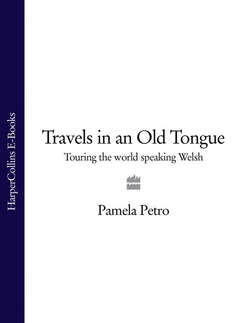Читать книгу Travels in an Old Tongue: Touring the World Speaking Welsh - Pamela Petro - Страница 9
Dychmygu to Imagine
ОглавлениеUnlike most travel narratives this is not a book about place but a book about language. Can a language be said to describe a place, a place the language that is spoken there? Is it possible to travel to many different places and arrive, not back home, but in the terra incognita of a new language? And just where might that be?
I’ve travelled to Brazil with Marguerite but I don’t speak Portuguese. While we were there she read the signs, laughed at the jokes, and got drawn into the novelas, or nightly soap operas, that hold the country enrapt. I stared at the outcroppings of abrupt, conical hills that pock Rio de Janeiro and felt I’d slipped into the iconic backdrop of a medieval painting; I was consumed by the tangy tastes and smells of the place. Did my country of the viscera have the same boundaries as hers of the mind? Stumps me.
If these questions were simply knotty in Brazil they’re absolutely bound, gagged and tortured in Wales, where 82 per cent of the population does not speak Welsh. Are these English-speaking Welshwomen and -men just tourists in their homeland, as I was a tourist in Brazil, because they can’t read the old poets, hold a government teaching post or watch the nightly soap opera Pobl y Cwm (People of the Valley)? Hardly. And yet … There is no self-governing political entity on earth that corresponds to Wales: it is not, to use geo-political terms, an historical nation. A leading Welsh academic, Gwyn A. Williams, wrote a book called When Was Wales? Might as well ask why is Wales? Because that’s where the sheep are? Because that’s where it rains all the time? Because that’s where Welsh is spoken?
Look at the two names of this twice-spoken-for land. ‘Wales’ comes from an old Saxon word meaning something like Place of the Romanized Foreigners. It’s an audacious etymology: around the fifth century AD Saxon invaders moved into Britain and called the inhabitants foreigners. They subdued most of the southern half of the island, and what they couldn’t they called Wales. The word Cymru – the Welsh name for Wales – was born around the year 580 in reaction to these events. The unconquered people who spoke Brythonic, the ancestor to Welsh as Anglo-Saxon is to English, called their bit of high, rough, western Britain Cymru, or the Home of Fellow Countrymen (the word Cymry means Welshmen). As late as the 1180s, Gerald of Wales – ironically writing in Latin – noted, ‘To this day our country continues to be called Wales and our people Welsh, but these are barbarous terms.’
Surely Cymru and Wales are two different places. They must be, for the languages that contain them, Welsh and English, hold such vastly different memories. In Wales the shorn flanks of the great, catapulting hills and the mottled pasturelands of the valleys are a consolation prize; in Cymru they’re home. To be a traveller in this place I love, which is all I claim to be – I’m hardly a linguist, I’m not even good at languages – it’s not enough to be led by the senses as I was in my tourist guise in Brazil. I want to break through the space – time continuum too, the way Tom did on his computer in New York, and travel into Wales’s past, its humour, its spirit, as well as its landscape. The only way I can think to do that, to get beyond Wales into Cymru, is to have a command of the Welsh language and the memories it holds within it.
Cue back to the god of Irony. To accomplish this, for me, the language coward, means leaving the geographic country behind in search of its invisible, verbal progeny in Europe, Asia and South America. Only by travelling everywhere but Wales can I hope to find my way to Cymru.
Equally ironic, however, is the fact that the Welsh language is in no way mine to have. There simply is no verb meaning ‘to have’, in the sense of ‘to possess’, in Welsh. Plane tickets, maps, languages even, are only ‘with you’, as if by their consent, implying that they, like much of the isle of Britain, are perhaps once and future possessions to be taken away at a moment’s notice. To say ‘I have language’ is to mean, ‘There is language with me’ – Mae iaith gyda fi. This pattern of having things ‘with you’ seems to me a grammar built on loss and impermanence, the linguistic heritage of the defeated. English, by comparison, is supremely confident in its sense of possession.
Which one will I use, I wonder uneasily, as Marguerite and I hoist our packs and slip on our sensible German walking shoes and begin searching the world for Cymru?
